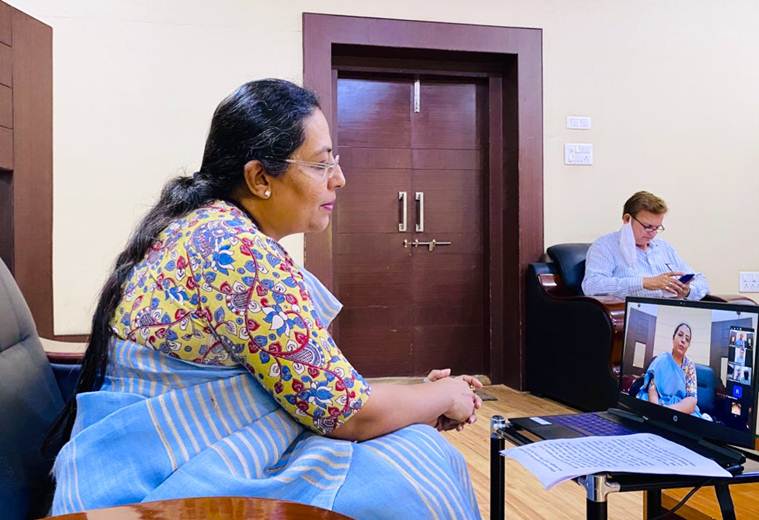What steps has the WCD taken to improve nutrition and introduce food fortification?
Food nutrition is implemented under the Integrated Child Development Services (ICDS) for adolescent girls aged 11 to 14 years. These are mostly girls out of school. We provide a supplementary nutrition programme for them which is essentially hot cooked meals. We also provide fortified nutrition through ration like rice, dal and moong. There are 42,000 such adolescent girls availing this benefit. The department also organises events under Poshan Aahar so that we can spread a holistic message of good health seeking behaviour and hygiene.
What about women nutrition?
We look after lactating and pregnant women. Special outreach efforts have been taken through Jan Andolan activities. We carry out cycle rallies, street plays and door-to-door visits. Every September you will see all these activities across the state. We educate women and girls as to what to eat and do to protect their health. Under the APJ Abdul Kalam Amrut Aahar Yojana, anganwadis provide hot cooked meals to pregnant and lactating women.
In Maharashtra, food fortification is not mandatory. Is the government thinking on these lines?
The food supplied to these women and children is fortified. Rice, dal, moong and the entire kit is fortified food. It goes through thorough checks and scrutiny before reaching a beneficiary. Nutrition packets are given to children and lactating mothers so that they can compensate for micro-nutrients that they miss through a daily diet.
With the Covid-19 pandemic how have nutrition programs been affected?
The lockdown was announced all of a sudden and we had no time to plan. We had to stop hot meals. In tribal areas, the Amrut Aahar Yojana was impacted. We had to go door-to-door to supply ration to beneficiaries. Before the pandemic our programme used to run from anganwadis. Because of the lockdown, anganwadis had to be closed. The Covid-19 pandemic affected the number of people we could reach because of social distancing. The department used mobile phones to train anganwadi workers on how to reach and counsel children, how to provide pre-school education. They went door-to-door to provide whatever services they could.
 “In tribal areas, the Amrut Aahar Yojana was impacted. We had to go door-to-door to supply ration to beneficiaries, otherwise before pandemic our programme used to run from anganwadis,” says Maharashtra Women and Child Development Minister Yashomati Thakur.
“In tribal areas, the Amrut Aahar Yojana was impacted. We had to go door-to-door to supply ration to beneficiaries, otherwise before pandemic our programme used to run from anganwadis,” says Maharashtra Women and Child Development Minister Yashomati Thakur.
What are the challenges the government is facing in encouraging food fortification?
We need to understand the nature around us. In hilly areas, there are so many vegetables that the local population can have to increase immunity. But because of our ignorance, we don’t utilise what is available to us. Food fortification can be replaced if people take a wholesome diet. In some anganwadis we have initiated the concept of a ‘Paras Bagh’, to plant and grow whatever is available. Every seasonal fruit will be cultivated. This is under planning. Raan Bhaja, a box of easily available wild vegetables, will be added to their food intake. It will act as supplementary nutrition. We are looking at natural produce instead of just relying on fortification.
During Covid-19 pandemic several children could not get access to government’s free meal service
We were late in planning because lockdown was suddenly announced. There was a 15-day delay initially, but we tried to reach everyone. I have been visiting anganwadis and meeting women to ask how the services are in Palghar and Melghat. I will soon visit Nandurbar.
The malnourishment survey could not be undertaken in last five months. Are we anticipating a rise because several migrant labourers are jobless?
I can’t comment on this. Everybody understands that due to Covid-19 things have not been the way they were. Some things are beyond our control. The malnutrition survey is underway, we are yet to know the rates.
Anaemia still remains a big problem for young girls and women. What steps are we taking?
Apart from fortified food, we are also educating women about importance of iron in diet. There are various activities carried out to teach them about good food habits.
Also Read | Gaurav Gogoi writes: Empower community resource professionals to prevent a crisis of malnutrition







